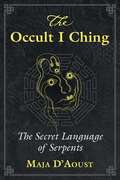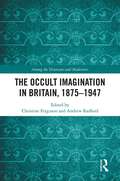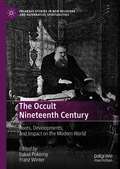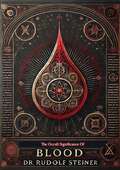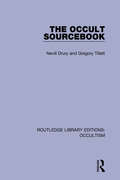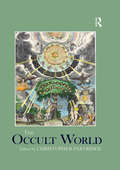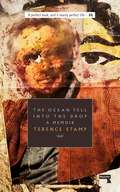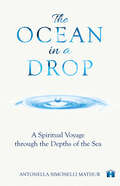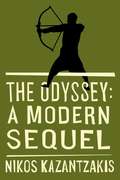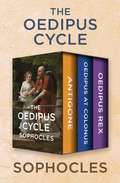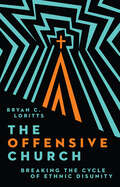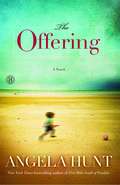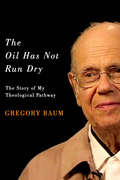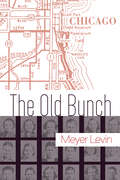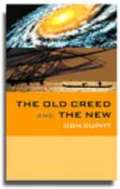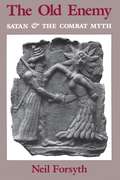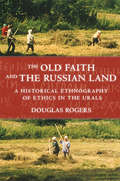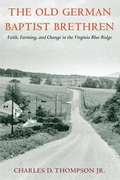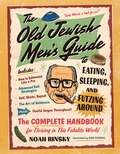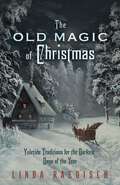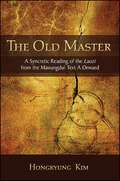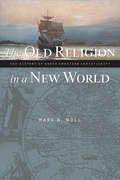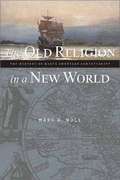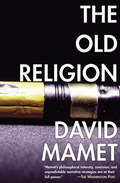- Table View
- List View
The Occult I Ching: The Secret Language of Serpents
by Maja D’AoustAn illustrated guide to the occult history, serpent magic, and practical application of the I Ching • Reveals how the sacred language of the original eight trigrams of the I Ching was discovered by a wisdom serpent known as Fu Xi • Explores how the I Ching formed the basis of the earliest Taoist philosophies, its complex correlation with human DNA, and its relationship with artificial intelligence • Provides new contemporary analysis of each of the 64 hexagrams, their changing lines, and archetypes of the I Ching • Includes original artwork highlighting the serpent magic within the system and tools to help you interpret the I Ching based on your own individual experience One of the oldest books in the world, the I Ching has been used in China for millennia to open a dialogue with divinity, gain insight and wisdom, and pull aside the curtain of reality to reveal the light of the heavens. Yet, despite its popularity over thousands of years, few understand its mysterious origins, symbolism, or occult connections. In this illustrated guide, Maja D&’Aoust applies her significant experience as a professional practitioner and scholar of the I Ching to provide a history of the oracle, explain the mechanisms at work behind it, and offer a new experiential approach to its interpretation. The author begins by examining the discovery of the I Ching by the first mythical emperor of China, Fu Xi, a divine being with the body of a serpent. She reveals how Fu Xi&’s eight original trigrams, also called the Ba Gua, provided a sacred language of symbols that allowed for communication between the diviner and the spirit world. Using the I Ching&’s principles of cosmology as a basis, the shamans of ancient China developed the earliest Taoist philosophies of nature, medicine, martial arts, and mathematics as well as ecstatic practices, war strategies, birth and death rituals, agricultural systems, and alchemical studies. D&’Aoust further shows how the I Ching relates to the mathematical sequences of biology and human DNA, examining the correlation between the serpent&’s tail and the double helix. She reveals how the ways the oracle connects with your own inner knowing parallel the ways in which DNA repairs itself. Providing a new analysis of each of the 64 hexagrams and their changing lines and archetypes, the author explores each hexagram&’s meanings in depth, alongside original artwork highlighting the serpent magic within the system and tools to help you interpret the I Ching based on your own individual experience. Revealing how the oracle holds complex networks of meaning that language alone fails to capture, D&’Aoust offers a new understanding of the Book of Changes and its many hidden lessons.
The Occult Imagination in Britain, 1875-1947 (Among the Victorians and Modernists)
by Andrew Radford Christine FergusonBetween 1875 and 1947, a period bookended, respectively, by the founding of the Theosophical Society and the death of notorious occultist celebrity Aleister Crowley, Britain experienced an unparalleled efflorescence of engagement with unusual occult schema and supernatural phenomena such as astral travel, ritual magic, and reincarnationism. Reflecting the signal array of responses by authors, artists, actors, impresarios and popular entertainers to questions of esoteric spirituality and belief, this interdisciplinary collection demonstrates the enormous interest in the occult during a time typically associated with the rise of secularization and scientific innovation. The contributors describe how the occult realm functions as a turbulent conceptual and affective space, shifting between poles of faith and doubt, the sacrosanct and the profane, the endemic and the exotic, the forensic and the fetishistic. Here, occultism emerges as a practice and epistemology that decisively shapes the literary enterprises of writers such as Dion Fortune and Arthur Machen, artists such as Pamela Colman Smith, and revivalists such as Rolf Gardiner
The Occult Nineteenth Century: Roots, Developments, and Impact on the Modern World (Palgrave Studies in New Religions and Alternative Spiritualities)
by Franz Winter Lukas PokornyThe nineteenth century witnessed a proliferation of alternative religious currents and practices, appropriating earlier traditions, entangling geographically distinct spiritual discourses, and crafting a repository of mindscapes eminently suitable to be accommodated by later generations of thinkers and practitioners. Penned by specialists in the field, this volume examines important themes and figures pertaining to this occult amalgam and its resonance into the twentieth century and beyond. Global guises of the occult, ranging from the Americas and Europe to India, are variously addressed, with special attention to the crucial role of mesmerism and the origins of modern yoga.
The Occult Significance Of Blood
by Dr Rudolf SteinerThe Occult Significance of Blood by Dr. Rudolf Steiner is a profound exploration of the esoteric and spiritual dimensions of blood, offering readers a deeper understanding of its vital role in human life and consciousness. Steiner, a pioneering figure in the fields of anthroposophy and spiritual science, presents a thought-provoking examination of blood as a conduit for the soul’s connection to the physical body and the cosmos.In this compelling work, Steiner delves into the mystical properties of blood, discussing how it serves as the medium through which spiritual forces interact with the material world. He explores the ancient and symbolic significance of blood in various religious and occult traditions, shedding light on its role as the carrier of life force, individual identity, and spiritual evolution.The Occult Significance of Blood addresses key concepts such as the relationship between blood and the soul, the connection between blood and hereditary traits, and the transformative potential of blood in spiritual development. Steiner also considers the implications of blood in the context of human evolution, suggesting that changes in the composition and understanding of blood reflect humanity’s shifting relationship with the spiritual world.This book is an essential read for those interested in the intersections of spirituality, science, and mysticism. Steiner’s insights challenge conventional views of blood as merely a biological substance, inviting readers to explore its deeper, occult significance. His clear and engaging writing makes complex spiritual concepts accessible to both newcomers and seasoned students of esotericism.The Occult Significance of Blood is a valuable resource for anyone seeking to understand the spiritual mysteries that underlie physical existence. Dr. Rudolf Steiner’s work continues to inspire and enlighten those on the path of spiritual inquiry, offering timeless wisdom on the profound connections between the body, soul, and spirit.This book provides a unique perspective on the spiritual importance of blood, making it a must-read for students of anthroposophy, occultism, and spiritual science.
The Occult Sourcebook (Routledge Library Editions: Occultism #2)
by Nevill Drury Gregory TillettOriginally published in 1978, The Occult Sourcebook has been compiled primarily for the many people who are for the first time becoming engrossed by the numerous and often confusing possibilities underlying the occult sciences. It consists of a series of articles on key areas, providing the reader with easy access to basic facts, together with a carefully planned guide to further reading. Critical comments on the recommended books allow the reader to select those which best suit their interests. The authors have also included a ‘Who’s Who of the occult’ to provide short biographies of some of the more amazing figures who have already travelled down the mystic path. The book offers a programmed system of exploration into the realms of the unknown. It will be invaluable to the increasing number of people who are concerned with the exploration of enlarging human consciousness.
The Occult World (Routledge Worlds)
by Christopher PartridgeThis volume presents students and scholars with a comprehensive overview of the fascinating world of the occult. It explores the history of Western occultism, from ancient and medieval sources via the Renaissance, right up to the nineteenth and twentieth centuries and contemporary occultism. Written by a distinguished team of contributors, the essays consider key figures, beliefs and practices as well as popular culture.
The Ocean Fell into the Drop: A Memoir
by Terence StampDuring my first visit to the cinema the empathy I felt from Gary Cooper was life-changing, and a secret dream was born in the darkened auditorium. Later, my forays to the East revealed an original take on humanity which fell into two categories: those who remembered and those who didn’t. The former by teaching the latter could transmit this memory, and communicate this spark of creation directly into the being of the other.The Ocean Fell into the Drop is a different kind of showbusiness memoir, one that traces Terence Stamp’s twin obsessions, acting and mysticism, and the relationship the two have to each other for him, through the trajectory of his life. On the way he discusses his directors, Fellini, Loach, Pasolini; actors, Olivier, Brando and Redgrave; and spiritual masters, Krishnamurti and Hazarat Inayat Khan, as well as his family, life in the East End, Sufism and style.
The Ocean in a Drop: A Spiritual Voyage through the Depths of the Sea
by Antonella Simonelli MathurThis mesmerising tale takes you on an enchanting journey to the whale-shaped island of Rodrigues, situated in the middle of the Indian Ocean. In the deep waters of this ocean, Mystic, a wise blue whale, guides her disciple, Lucy, a sea drop, on a spiritual journey.As Lucy follows Mystic, she learns how to connect with her true self, find inner peace, and overcome obstacles to become a better version of herself. On this magical journey, Lucy meets several unforgettable characters along the way and uncovers the wonders of the underwater world. The Ocean in a Drop is a reminder that wisdom doesn&’t solely belong to the human species; it belongs equally to all the living beings and forces of nature.With spectacular prose and breathtaking imagery, this mystical tale invites readers to explore the depths of their souls and embark on a spiritual voyage that will uplift, inspire, and make them embrace the beauty of life.
The Odyssey
by Nikos KazantzakisA continuation of Homer's epic poem, Kazantzakis's own Odyssey finds Odysseus once again leaving Ithaca on finding that the satisfactions of home and hearth are not as he remembered them. Following an encounter with the former Helen of Troy (now returned to her husband, the king of Sparta, after the ignominious defeat of the Trojans), Odysseus gradually wends his way to Egypt and southward, grappling all the while with questions about the nature of God. Considered by Kazantzakis himself to be one of his most important works, The Odyssey takes readers on a richly imagined quest for adventure and understanding with one of literature's most timeless characters.
The Oedipus Cycle: Antigone, Oedipus at Colonus, and Oedipus Rex (The Oedipus Cycle #1)
by SophoclesThe doomed king of Thebes brings shame on his family in this iconic three-play cycle of ancient Greek literature, a foundational work of Western drama. Oedipus Rex: As a young man, Oedipus was told of a prophecy that he would kill his father and marry his mother. Fleeing his home to escape his destiny, he becomes the king of Thebes by marrying the former king&’s widow. But now Thebes is cursed until Oedipus discovers who killed his predecessor—a mystery that will lead him to his own doom. Oedipus at Colonus: Blind and exiled from his own country, Oedipus takes up residence in Colonus while his two sons battle for the throne of Thebes. An oracle has pronounced that the location of their disgraced father&’s final resting place will determine which of them will win. But an old enemy has his own plans for the burial. Antigone: The war is over and Thebes&’s ruler, Creon, decrees that the body of Polynices—Oedipus&’s son—is not to be buried. But Antigone, the late warrior&’s sister, answers to a higher authority. When she breaks the law to bury her brother with proper rites, her act of civil disobedience will unleash great upheaval.
The Offensive Church: Breaking the Cycle of Ethnic Disunity
by Bryan C. LorittsCrises around race have put the church in a defensive posture, always reacting to racial conflicts in society. But Jesus wants more. He wants Christians to play offense by discipling people into a new humanity, where we push beyond mere diversity and into a biblical vision for ethnic unity. Bryan Loritts calls Christians to proactively and intentionally live out the embodied reality of a people at one with one another. We play offense by practicing a robust gospel, preparing reliable leadership, and providing relational environments so that the church becomes the aroma of Christ to our culture and gains ground against the demonic foothold of racism in all its forms.
The Offering
by Angela HuntFrom bestselling author Angela Hunt, the heart-wrenching story of a young mother who unknowingly gave away her own child after serving as a surrogate for a childless couple.Amanda Hocking is a typical young wife and mother struggling to make ends meet. She decides to help a childless family by becoming their gestational surrogate, hoping to achieve some financial stability of her own. After a few false starts, Amanda finally gets pregnant with another couple's embryo, but just as she is entering her final month of pregnancy, her soldier husband is killed. Devastated, Amanda goes through the motions trying to regain her equilibrium and raise her daughter alone. Three years later, Amanda finally sees a photograph of the child she carried for the other family. He looks remarkably familiar; is it possible she gave birth to her own biological baby and unknowingly gave him away? When a DNA test confirms her mistake, Amanda must choose between the desires of her grieving heart and what is best for the child she has never truly known.
The Oil Has Not Run Dry: The Story of My Theological Pathway
by Gregory BaumBorn to a Jewish mother and Protestant father in 1923 Berlin, Gregory Baum has devoted his career to a humanistic approach to Catholicism. In The Oil Has Not Run Dry, Baum shares recollections about his lifelong commitment to theology, his atypical views, and his evolving understanding of the Catholic Church’s message. Baum reflects on his groundbreaking work with the Second Vatican Council (1962-65) and how it helped to open the Church to a new understanding of outsiders - one that advocated cooperation with world religions in support of peace and justice and respected secular philosophies committed to truth and social solidarity. Later embracing Latin American liberation theology, he became a leading thinker of the Catholic Left in Canada, adopting radical positions that initially earned support from Canadian bishops in the 1970s. Diverging from official Catholic doctrines regarding women and sexual ethics, Baum eventually left the priesthood, but continued to teach theology and remained active in the Church. The Oil Has Not Run Dry also discusses the contrast between Catholicism in Quebec and English-speaking North America, and the ways in which Baum sees Quebec’s culture as more marked by social solidarity. This significant difference has inspired his own writings which present the original development of Catholic thought in Quebec to an English-speaking readership.
The Oil Has Not Run Dry: The Story of My Theological Pathway (Footprints Series #23)
by Gregory BaumBorn to a Jewish mother and Protestant father in 1923 Berlin, Gregory Baum devoted his career to a humanistic approach to Catholicism. In The Oil Has Not Run Dry, Baum shares recollections about his lifelong commitment to theology, his atypical views, and his evolving understanding of the Catholic Church’s message. Baum reflects on his groundbreaking work with the Second Vatican Council (1962-65) and how it helped to open the Church to a new understanding of outsiders - one that advocated cooperation with world religions in support of peace and justice and respected secular philosophies committed to truth and social solidarity. Later embracing Latin American liberation theology, he became a leading thinker of the Catholic Left in Canada, adopting radical positions that initially earned support from Canadian bishops in the 1970s. Diverging from official Catholic doctrines regarding women and sexual ethics, Baum eventually left the priesthood, but continued to teach theology and remained active in the Church. The Oil Has Not Run Dry also discusses the contrast between Catholicism in Quebec and English-speaking North America, and the ways in which Baum sees Quebec's culture as more marked by social solidarity. This significant difference has inspired his own writings, which present the original development of Catholic thought in Quebec to an English-speaking readership.
The Old Bunch
by Meyer LevinThe Old Bunch chronicles the lives of nineteen Jewish men and women on Chicago's west, a spawling-yet-intimate portrait of American life during the Great Depression, by an author the LA Times hailed as "the most significant American Jewish writer of his time."Among the various lives depicted so vividly are those of Joe Feeman, a wayward artist who loses the love of his life to a doctor whose future path is as clear as Joe's is uncertain. Sam Eisen appears to be following a stable path into law, but in actuality his contempt for the conformist lifestyles of his friends is second only to the distain he feels for the very life he has chosen. Sol Meisel starts out pursuing his dreams of becoming a professional athlete, before settling down to join his father's business. Interweaving storylines of rebellion and growing up, Levin unsentimentally generates a worldview that is striking in its pre-World War II innocence, while also clearly delineating the old world from the new.The Old Bunch is one of the great novels of and about the interwar period. Both of its time and remarkably fresh, it is an outstanding achievement by a preeminent American writer.Norman Mailer referred to Levin as "one of the best American writers working in the realistic tradition." Ernest Hemingway called his book Citizens "a fine American novel - one of the best I ever read." In 1957, Levin won the Special Edgar Award for his book Compulsion, the renowned account of the Leopold and Loeb murders and the basis for the 20th Century Fox motion picture.This edition has been authorized by the Estate of Meyer Levin.REVIEWS"The Old Bunch is written in good hard-driving colloquial prose, and is full of sharp characterizations... A very fine novel with the speed and lustiness and brawling of the world's fourth largest city." --New Republic"A landmark in the development of the realistic novel... incident by incident it makes vivid and exciting reading... it brilliantly succeeds in taking the reader on a memorable tour of the world in which the "old bunch" lived." --NY Times
The Old Creed and the New
by Don CupittThe Old Creed and the New is Don Cupitts latest writing in his on-going project to modernize religious thought. His previous works have argued that since the Enlightenment almost every new movement in Christianity has been neo-Conservative and authoritarian. Here he looks to the liberal theologians of a hundred years ago who attempted to modernize religion but were often content merely to simplify and liberalize the creed. Todays radical theology, he argues, contrasts by beginning to produce something so different from traditional religion that the public may at first feel baffled by it. Don Cupitt here sharply juxtaposes the traditional Apostles creed of western Christianity and the emergent creed of modern radical theology. Side by side, they look amazingly different, and Cupitt carefully explains what is happening, and why. The main change, he argues, is that the old creed situated the believer within a huge narrative cosmology, the central myth of a great religion-based civilization, whereas the new creed merely defines the bare outlines of a modern spirituality. The new religion emerges as being scarcely creedal at all: it is the practice of solar living. People no longer look up: instead, they are content simply to claim their own lives, to find their own way of living them, and to live life to its fullest. Just ordinary life itself is now the religious object - which shows the post-protestant character of the new outlook. The Old Creed and the New tries to define and situate this new kind of religion, and encourages the reader to think about it both intellectually and spiritually.
The Old Enemy: Satan and the Combat Myth
by Neil ForsythThe description for this book, The Old Enemy: Satan and the Combat Myth, will be forthcoming.
The Old Faith and the Russian Land: A Historical Ethnography of Ethics in the Urals (Culture and Society after Socialism)
by Douglas RogersThe Old Faith and the Russian Land is a historical ethnography that charts the ebbs and flows of ethical practice in a small Russian town over three centuries. The town of Sepych was settled in the late seventeenth century by religious dissenters who fled to the forests of the Urals to escape a world they believed to be in the clutches of the Antichrist. Factions of Old Believers, as these dissenters later came to be known, have maintained a presence in the town ever since. The townspeople of Sepych have also been serfs, free peasants, collective farmers, and, now, shareholders in a post-Soviet cooperative.Douglas Rogers traces connections between the town and some of the major transformations of Russian history, showing how townspeople have responded to a long series of attempts to change them and their communities: tsarist-era efforts to regulate family life and stamp out Old Belief on the Stroganov estates, Soviet collectivization drives and antireligious campaigns, and the marketization, religious revival, and ongoing political transformations of post-Soviet times. Drawing on long-term ethnographic fieldwork and extensive archival and manuscript sources, Rogers argues that religious, political, and economic practice are overlapping arenas in which the people of Sepych have striven to be ethical-in relation to labor and money, food and drink, prayers and rituals, religious books and manuscripts, and the surrounding material landscape.He tracks the ways in which ethical sensibilities-about work and prayer, hierarchy and inequality, gender and generation-have shifted and recombined over time. Rogers concludes that certain expectations about how to be an ethical person have continued to orient townspeople in Sepych over the course of nearly three centuries for specific, identifiable, and often unexpected reasons. Throughout, he demonstrates what a historical and ethnographic study of ethics might look like and uses this approach to ask new questions of Russian, Soviet, and post-Soviet history.
The Old German Baptist Brethren: Faith, Farming, and Change in the Virginia Blue Ridge
by Charles D. Thompson Jr.Since arriving nearly 250 years ago in Franklin County, Virginia, German Baptists have maintained their faith and farms by relying on their tightly knit community for spiritual and economic support. Today, with their land and livelihoods threatened by the encroachment of neighboring communities, the construction of a new highway, and competition from corporate megafarms, the German Baptists find themselves forced to adjust. Charles D. Thompson Jr.'s The Old German Baptist Brethren combines oral history with ethnography and archival research--as well as his own family ties to the Franklin County community--to tell the story of the Brethren's faith on the cusp of impending change. The book traces the transformation of their operations from frontier subsistence farms to cash-based enterprises, connecting this with the wider confluence of agriculture and faith in colonial America. Using extensive interviews, Thompson looks behind the scenes at how individuals interpret their own futures in farming, their hope for their faith, and how the failure of religiously motivated agriculture figures in the larger story of the American farmer.
The Old Jewish Men's Guide to Eating, Sleeping, and Futzing Around
by Noah RinskyFrom the viral social media account @oldjewishmen comes a hilarious and irresistible guide and perfect gift for every OJM and the people who put up with him Here is a humorous, surprisingly stylish, and crotchety celebration of a most fascinating group of fellas: Old Jewish Men. In this essential guide, readers learn how to eat, dress, get around town, and schmooze like a seasoned OJM. Ever wonder why Old Jewish Men eat so much cottage cheese and melon? If Larry David and Bernie Sanders have the same barber? Who is the next great up-and-coming OJM? (NOTE: You don&’t need to be old, Jewish, or a man—it&’s a lifestyle.) Plus, there&’s helpful jargon, detailed deli and coffee shop rundowns, and the ten OJM archetypes, from New York Schlubs to Tough Guys to Grumpy Intellectuals. A perfect gift for any Jewish dad/granddad/uncle/brother or anybody who likes a healthy shmear of classic Jewish humor, the book is full of hilarious full-color illustrations and chapters including: How to Exist in This Fakakta World; The Art of the Schmooze; How to Live Forever; and King of the Temple.
The Old Magic of Christmas: Yuletide Traditions for the Darkest Days of the Year
by Linda Raedisch'Tis the Season for Witches, Elves, and a Legion of GhostsNot so very long ago, Yuletide was as much a chilling season of ghosts and witches as it was a festival of goodwill. In The Old Magic of Christmas, you'll rub elbows with veiled spirits, learn the true perils of elves, and discover a bestiary of enchanted creatures. Rife with the more frightful characters from folklore and the season's most petulant ghosts, this book takes you on a spooky sleigh ride from the silvered firs of a winter forest to the mirrored halls of the Snow Queen. Along the way, you'll discover how to bring the festivities into your home with cookie recipes and craft instructions, as well as tips for delving more deeply into your relationship with the unseen.Praise:"Steeped in history and adorned with a bit of enchantment, The Old Magic of Christmas is the perfect book to read by a winter's fire with a mug of mulled cider in hand."—Deborah Blake, author of The Witch's Broom"...[A] fascinating journey into the stories behind the tinsel and bows."—Doreen Shababy, author of The Wild & Weedy Apothecary"...[A]n intriguing little tome that explores the darker side of the Yuletide holiday."—Ellen Dugan, author of The Enchanted Cat
The Old Master: A Syncretic Reading of the Laozi from the Mawangdui Text A Onward (SUNY series in Chinese Philosophy and Culture)
by Hongkyung KimThis unique, highly contextualized translation of the Laozi is based on the earliest known edition of the work, Text A of the Mawangdui Laozi, written before 202 BCE. No other editions are comparable to this text in its antiquity. Hongkyung Kim also incorporates the recent archaeological discovery of Laozi-related documents disentombed in 1993 in Guodian, seeing these documents as proto-materials for compilation of the Laozi and revealing clues for disentangling the work from complicated exegetical contentions. Kim makes extensive use of Chinese commentaries on the Laozi and also examines the classic Chinese texts closely associated with the formation of the work to illuminate the intellectual and historical context of Laozi's philosophy.Kim offers several original and thought-provoking arguments on the Laozi, including that the work was compiled during the Qin, which has traditionally been viewed as typical of Legalist states, and that the Laozi should be recognized as a syncretic text before being labeled a Daoist one.
The Old Religion in a New World: The History of North American Christianity
by Mark A. NollOne of our foremost historians of religion here chronicles the arrival of Christianity in the New World, tracing the turning points in the development of the immigrant church that have led to today's distinctly American faith.Taking a unique approach to this fascinating subject, Noll focuses on what was new about organized Christian religion on the American continent by comparison with European Christianity. In doing so, Noll provides a broad outline of the major events in the history of the Christian churches that have filled North America with such remarkable vitality and diversity. He also highlights some of the most important interpretive issues in the transfer of the hereditary religion of Europe to America.
The Old Religion in a New World: The History of North American Christianity
by Mark NollTaking a unique approach to this fascinating subject, Noll focuses on what was new about organized Christian religion on the American continent by comparison with European Christianity. In doing so, Noll provides a broad outline of the major events in the history of the Christian churches that have filled North America with such remarkable vitality and diversity. He also highlights some of the most important interpretive issues in the transfer of the hereditary religion of Europe to America.
The Old Religion: A Novel (Literatura Ser.)
by David Mamet&“Mamet&’s intellectual rigor is evident on every page. There is not a wasted word&” in this novel based on the wrongful murder conviction of a Jewish man (Time Out). In 1913, a young woman was found murdered in the National Pencil Factory in Atlanta. The investigation focused on the Jewish manager of the factory, Leo Frank, who was subsequently forced to stand trial for the crime he didn&’t commit and railroaded to a life sentence in prison. Shortly after being incarcerated, he was abducted from his cell and lynched in front of a gleeful mob. In vividly re-imagining these horrifying events, Pulitzer Prize–winning author David Mamet inhabits the consciousness of the condemned man to create a novel whose every word seethes with anger over prejudice and injustice. The Old Religion is infused with the dynamic force and the remarkable ear that have made David Mamet one of the most acclaimed voices of our time. It stands beside To Kill a Mockingbird as a powerful exploration of justice, racism, and the &“rush to judgment.&” &“Mamet&’s philosophical intensity, concision, and unpredictable narrative strategies are at their full power.&” —The Washington Post &“In this historical novel, playwright, filmmaker, and novelist Mamet presents disturbing cameos of Jewish uncertainty in a Christian world.&” —Library Journal &“The horror of the story is beautifully countered by the unusual grace of Mamet&’s prose.&” —The Irish Times
